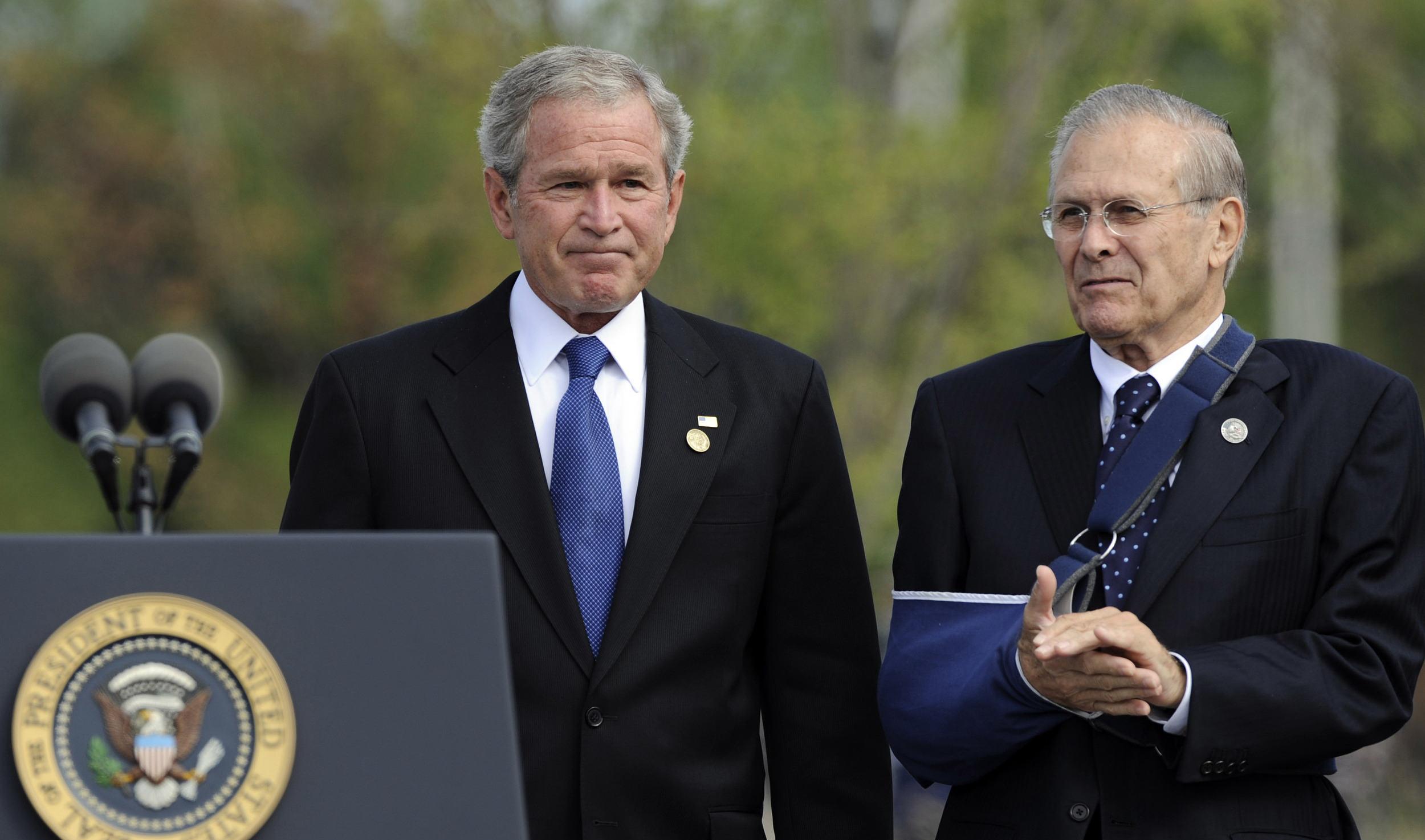Reporter | Tian Siqi
On Tuesday (June 29), local time, Donald Rumsfeld, who was twice the U.S. defense secretary and one of the main planners of the Iraq war, died at the age of 88.
By hosting frequent war-related briefings as defense secretary from 2001 to 2006, Rumsfeld became a globally recognizable television personality, sought after for his good eloquence and outspokenness.
His former boss, former U.S. President George W. Bush, said in a statement Wednesday that Rumsfeld was "a man of intelligence, integrity, and energy" and that he "never fears or shies away from responsibility before making difficult decisions."
But in the eyes of anti-war activists, Rumsfeld is the historical sinner who dominated the two wars in the United States, not only inflicting heavy casualties on civilians and American soldiers, but also leaving a stain on U.S. diplomacy as a "foreign intervention."

Born in 1932, Rumsfeld entered Princeton University on a scholarship and served as a pilot in the U.S. Navy. Although he was elected to a Republican congress in his home state of Illinois, Rumsfeld's path to politics did not stop there.
After leaving Congress, he joined the Nixon administration as director of the Office of Economic Opportunity, later as ambassador to NATO, and as White House chief of staff in the Ford administration. In 1975, Ford appointed him Secretary of Defense, the youngest U.S. defense secretary at the time.
After leaving office in 1977, Rumsfeld worked for the private sector until he was reinstated as defense secretary by George W. Bush in 2001, when he became the oldest defense secretary in the United States and the only defense secretary to serve twice.
About nine months into office, Rumsfeld encountered a major event that ran through the rest of his tenure: On the morning of September 11, 2001, when terrorists hijacked two airliners and crashed into the World Trade Center in New York, another airliner crashed into the Pentagon in Washington, D.C., home of the Department of Defense.
Rumsfeld later recalled that he was in a meeting with nine members of the House of Representatives in his office on the third floor. As soon as the impact occurred, the small wooden table in the conference room began to tremble. Rumsfeld, one of the first people in the Pentagon to arrive at the scene of the accident, helped carry stretchers to treat the wounded before returning to the building to continue his duties as secretary of defense. Less than a month after the incident, George W. Bush announced a military offensive against Afghanistan on October 7.
The following year, the George W. Bush administration's attention turned again to Iraq. U.S. officials, including Rumsfeld, asserted that then-Iraqi President Saddam Hussein possessed chemical and biological weapons.
When it comes to whether Iraq will supply terrorists with weapons of mass destruction, Rumsfeld left a much-maligned "tongue twister": "Some things are known and we know what we know." There are also known unknowns, that is, we know some things that we don't know. But there are also unknown unknowns — things we don't know we don't know. ”
According to this, Rumsfeld later even named the memoir "Known and Unknown".
In March 2003, the United States launched an offensive against Iraq. The move was approved by Congress, but not by the United Nations Security Council. It wasn't until the withdrawal of U.S. troops in 2011 that the Iraq War came to an end. During this period, more than 4,400 U.S. soldiers were killed, and tens of thousands of Iraqi troops and militants of various factions died.
Rasha Al Aqeedi, an analyst from Mosul, Iraq, told The Associated Press: "The war in Iraq has been a stain on U.S. foreign policy. It shaped an entire generation's perception of 'American intervention.'" ”
Iyad el-Bagdadi, president of the Kawa kibi Foundation for Arab Countries, told Al Jazeera: "Donald Rumsfeld is a war criminal who presided over the illegal war of mass killings of civilians, systematic torture and pillaging, and mass corruption. ”
Because of the controversy surrounding the war in Iraq, Rumsfeld resigned twice in 2004 when it was reported that U.S. forces had mistreated detainees in Iraqi prisons. Rumsfeld later called the incident the darkest hour of his tenure as defense secretary. But Rumsfeld eventually remained in office until late 2006, when he was replaced by another Republican, Robert Gates.
Rumsfeld told colleagues that "for some, gracefully withdrawing from painful and ugly battles may be a comfort," "but the enemy thinks differently." ”
In his memoirs published in 2011, Rumsfeld still showed no remorse for Iraq, insisting that the overthrow of Saddam Hussein's regime was justified. After costing the United States $700 billion, Rumsfeld wrote: "After escaping Saddam's brutal regime, the region has created a more stable and secure world." ”
After retiring, Rumsfeld began leading a foundation of the same name as himself, working with a number of charities that served military families and wounded veterans.
In a 2009 book about Rumsfeld's experience, author Bradley Graham argued that blaming Rumsfeld for the Iraq war was "neither correct nor fair."
"But a lot of what happened to Rumsfeld was the result of his own actions," Graham wrote in a book titled "By His Own Rules." "The way he does things is as easily remembered as the way he does. He was full of internal contradictions – with qualities such as genuine charm, kindness and elegance, but always giving the impression of being rough and imperious. When he needs friends, he often alienates others and makes enemies for himself. ”